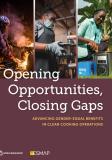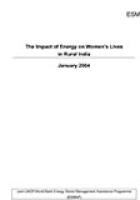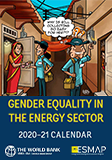Publications
This report highlights the tremendous difference that access to improved energy services in the form of biomass stoves, petroleum fuels, and household electrification makes for the life of rural women. Of course, the benefits of rural energy services can differ by region, class, caste, education, and household occupation, but the overall pattern that emerges is that the benefits of improved rural energy services for rural women in India are substantial.
The use of Liquefied petroleum gas (LPG) or kerosene stoves relieves women of much of the most arduous tasks involved in cooking for their families and permits them to lead a relatively comfortable and healthy life. Household electrification also has positive consequences for women in terms of their general quality of life, including an increased likelihood that they will read, watch television, and earn income.
Having lights at night increases their ability to read in the evening after dark. However, the advantages of electrification could be exploited even more, as there still is a puzzling underinvestment in appliances such as mixers, grinders, blenders, and others that could help women with their daily household work.


